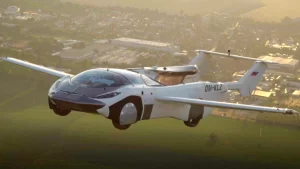Table of Contents
The tech behind the European flying car, originally developed and successfully test-flown in Europe, has been bought by a Chinese firm.


Fueled by a BMW engine and regular gasoline, the AirCar completed a 35-minute flight between two Slovakian airports in 2021, utilizing runways for both take-off and landing. Its transformation from a car into an aircraft took slightly over two minutes.

Join our Telegram Channel for Updates
Now, vehicles based on its design will be deployed within a “specific geographical region” of China. Hebei Jianxin Flying Car Technology Company, headquartered in Cangzhou, has secured exclusive rights to manufacture and operate AirCar aircraft within an undisclosed area.
The company established its own airport and flight school following a prior acquisition from another Slovak aircraft manufacturer, as stated by Anton Zajac, co-founder of Klein Vision, the company behind AirCar.
While China has been at the forefront of the electric vehicle (EV) revolution, it is now actively exploring flying transportation solutions.
Last month, a company named Autoflight conducted a test flight of a passenger-carrying drone between Shenzhen and Zhuhai, completing a journey that typically takes three hours by car in just 20 minutes, although no passengers were onboard.
Additionally, in 2023, the Chinese firm eHang received a safety certificate from Chinese authorities for its electric flying taxi. Meanwhile, the UK government has projected that flying taxis could become a common sight in the skies by 2028.
Unlike vertical take-off and landing (VTOL) passenger aircraft, AirCar does not ascend and descend vertically and instead requires a traditional runway.
KleinVision declined to disclose the financial terms of the technology sale. AirCar obtained a certificate of airworthiness from the Slovak Transport Authority in 2022 and was featured in a video released by YouTuber Mr. Beast earlier this year.
However, there are significant challenges ahead for this mode of transportation in terms of infrastructure, regulation, and public acceptance of the technology.
Aviation consultant Steve Wright remarked that the advent of personal flying transport is causing significant disruption. He noted that global efforts to regulate the sector have led to a flurry of new questions that need to be addressed.
Wright also pointed out that China might view this as an opportunity to gain a competitive edge, similar to its leadership in the electric car market.
While prototypes like AirCar are exciting, the practical reality may involve mundane aspects such as queues and security checks, according to Wright.









